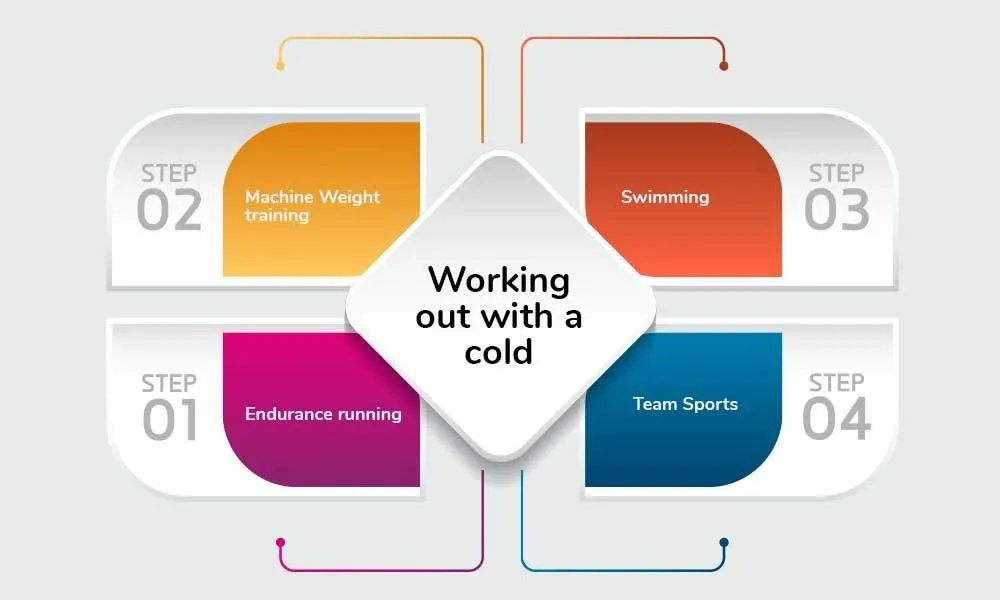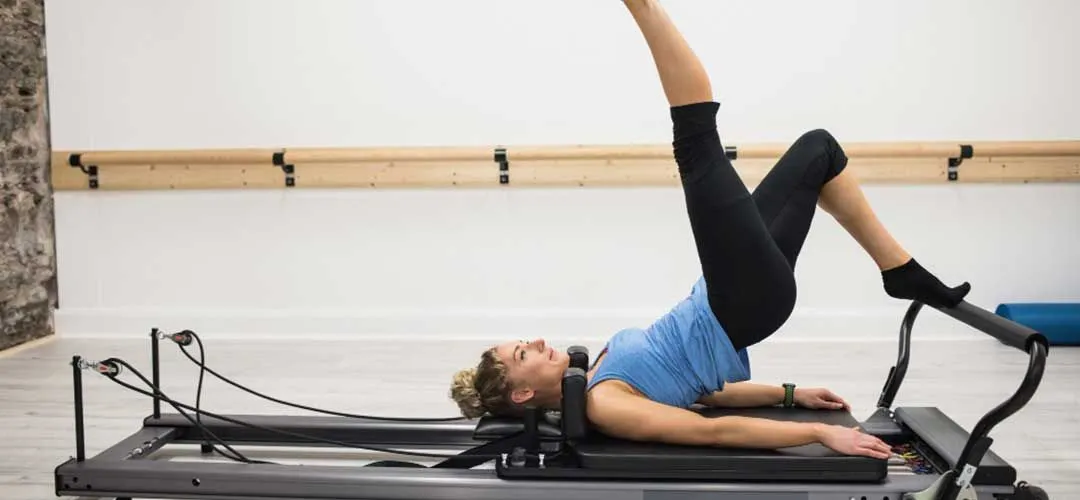If you are feeling sick because of the weather changes, exercise may be the last thing on your mind. You should not work harder when your body is already under so much stress. However, some light to moderate physical activity may actually help you feel better in some cases and can even help you drive the seasonal infection away.
You may note that since you are under the weather, you would not be in a position to work out for extended hours. We thus recommend that you stay away from strenuous exercises like HIIT, Strength Training, and Endurance Training. Doing simple and non-taxing exercises would help you to boost your immunity. Be sure to call it quits for a day or two if your illness worsens.
Did you know? There is also an exception to this golden rule and it is called the Neck Rule. Formulated by Dr. Richard Besser, working out is beneficial in common cough and cold, sinus pressure, stuffy nose, or even flu. It is called the Neck Rule because all these ailments affect parts of the human body above the neck.
Some good workout options can play a positive role in curing seasonal illnesses. For beginners, you can note that if you have a little cough or cold, you won’t even mind it at first and you would not find it a deterrent to your fitness schedule.
The situation could demand some medical attention a day before going to the gym and taking an antibiotic would help. If the situation worsens (with symptoms like headache, backache, or nausea), you should see your doctor immediately.
Here are some good cold relief exercises that you can start doing immediately:
Walking
Jogging
Running
Yoga
Qi Gong
Originated in Ancient China, Qi Gong is one of the good exercises that you can consider for getting some relief from the cold. It is a slow and mindful movement that is a cross between martial arts and meditation. This ancient exercise has a low intensity and can reduce stress and anxiety, improve blood flow, and increase energy quickly.
Tip: Going with online yoga training or working out with kettlebells at home would also help.
How long does a cold last? What Makes Online Yoga Training The Way To Go For Virtual Fitness At Home In 2020?
Cold and cough are seasonal illnesses that are caused by a wide variety of viruses. They are not life-threatening maladies but you should consult a healthcare specialist or go for some easy home remedies to resolve the issue faster.
Cold should not last more than a couple of weeks but for the first few days, the person could be contagious. The virus may spread to others rather quickly, especially if the recipient has lower immunity. Some age groups or health conditions like the elderly, infant, or sick could be at higher risk.
Working out with a little bit of cold and cough would make you warmer. You should, however, not overdo it to the extent of weakening yourself, or else your immunity could suffer. You can drink some warm water before you get on with your warmup exercises to build some momentum in your favor.
If you are not feeling well, you should not try lifting high dead weights for longer periods. This would weaken your strength and immunity, and can quickly make your health condition worse. You should only stick to simple exercises like pushups, stair climbing, or maybe a bit of meditation.
We recommend you stay away from the following exercises:
Endurance running or long-form of running is a continuous form of running that spans a distance of at least 3 km. It is considered an aerobic exercise and is named as such because it increases stamina (or endurance). However, it can quickly worsen your state if you are feeling feverish.
Machine weight training is a specialized form of exercise that uses gravity as the primary resource for increasing strength. As an energy-intensive exercise, it requires fitness-centric machines that deliver different levels of resistance to the person exercising on them through a variety of exercises.
Swimming is one of the easiest and simplest workouts because it requires a constant workup of your muscles against a constant (or increasing force of water). It boosts your heart rate, builds muscle strength, and increases endurance. Water would cause more harm if you are feeling cold or fever.
Team sports are the ones that require at least twelve persons across two competing sides that are working for an exclusive result. Such sports may include football, basketball, or rugby, etc. These require a lot of energy and you could feel weak as you start moving around your teammates.
Tip: Here are some of the most commonly committed mistakes that fitness professionals make in a gym.
We are investigating two special cases, one of doing Pilates and one of lifting weights on two persons. Let’s assume that they have been suffering from a seasonal cold for the past few days and that the doctors have asked them to take some bed rest. To standardize the results, we would also assume that both the subjects have similar levels of immunity and that they are working in the same gym.
Pilates can quickly worsen your medical condition, if not make you bed-ridden.
It is important to know that skipping a day or two of your exercises won’t cause you to shed a lot of weight. Pilates is the toughest of exercises and can quickly wreak havoc on someone’s natural immunity. It might also catapult the illness to a higher stage, something you would not want for yourself.
There are some risks also associated with Pilates training. These are diaphragmatic rupture, cervical disk herniation, and other minor stress fractures. The situation may become severe if you have just recovered from any other illness or if you are working out obsessively without considering the risks.
If your cold is not too severe and you are not experiencing any symptoms of fever or nausea, you may continue with your routine by reducing the reps and intensity.
Some mild congestion should not stop you from doing your best in the gym, provided your doctor doesn’t think otherwise. Some medicines may increase your heart rate or make you sleepy. This could become risky when you are lifting weights because now your heart is forced to pump very hard, especially when your immune system is busy fighting off the infection.
This would drain your energy faster and you might start feeling some giddiness, nausea, or even fever. We would thus recommend you to take a few days' break and come back stronger after the cold has subsided. You should be reasonably confident to build your way up after that, even if you were working out with a lot of progress to show.
Moderation holds the key to making the most of your workout session in the event of any illness. It is always important to take some time out for rest and recovery after periods of intense training. When you are ill, you should give your immune system enough time to strengthen itself.
The reason we fall ill is that the number of infection-fighting white blood cells in our body reduces to a certain minimum number, and the infectious bacteria take control over. This causes the body to either go in an energy-saving mode or release more stress hormones, and both these processes take up a part of the remaining energy stored in your body's cells.
Consequently, you start feeling worse and weaker, and taking some rest is the only way out. Medications too can help you if the situation has persisted for several days and you are not feeling any better. Your fitness schedule can wait.
You will not lose your progress if you do not go to the gym for a few days. While your consistency and intensity could take a hit for some time, you can understand that the change is temporary and you can make up for the loss in just a few days. We work out only to keep ourselves fitter and not to fall ill- and what could be more ironic than training ourselves in a way that makes us more sad than happy?


